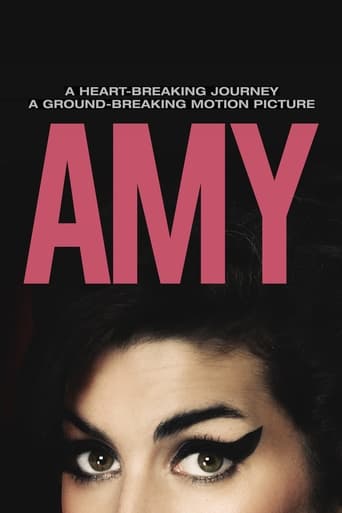

A tragic look at fame, addiction and how one gifted young woman was destroyed by both. I cannot say that I found this film enjoyable, partly because almost every single shot came from the paparazzi. But I could not look away. None of us could.
... View MoreIn this documentary, we follow Amy Winehouse through her journey towards becoming a highly admired and world known artist. We get a look inside her mind, and an insight in how she felt and acted when she was alone or with friends, with no cameras rolling. We see how her music was her savior, but also her destruction. She wasn't meant for a life like a celebrity, and a dangerous combination of her becoming so, and getting into a very stormy relationship ended up with her dead by a heart attack caused by a serious abuse of alcohol and drugs.I find that this documentary is heartbreaking and dark, but in a good way. It truly describes Amy's life for better or for worse. I have never been a big fan of Amy, and the only thing I ever remember hearing about her was from my mom when I was little. She was quite upset on the day of her death, and wouldn't stop talking about what a shame it was. Back then I didn't really put a lot of thought into it, but while watching this movie I truly understood how sad a story it actually is. She sure had an outstanding talent, but she was just never meant to be famous. She struggled a lot with her mind, and yet her managers - and even her own dad - kept her in the spotlight at all times. In the beginning her music was her savior when she went through a rough time. It helped her get over heartbreaks, and process her thoughts and feelings. And what a shame it is that something that beautiful and peaceful must be consumed by fame, paparazzi's and the media. I must admit that with the pressure she was under twenty-four-seven it doesn't surprise me that she reached a point where she couldn't take it anymore. She was a fragile and misunderstood human, but the surrounding world didn't take this into consideration. What makes this documentary so outstanding and probably one of the best I have seen is, that it hasn't been made to entertain. It has been made to tell a story, and because it is so raw, it gets truly sincere. It's an honorable attempt at showing her meaningful lyrics, and great successes, but at the same time the self-harming and declines from where it all first started.
... View MoreThe film is obviously about Amy Winehouse, who has a tough life with ups, but many downs. She's a great singer and gets a lot of recognition for it. But she gets into drugs and alcohol because of Blake and actually gets addicted. She sadly ends up dying because her body couldn't take it anymore.
... View MoreI have known my share of addicts. Even though Amy was famous, she was no different than any other addicts. I am glad the film makers showed her as not just an out of control addict. She knew what she was which is what makes it even more heartbreaking. She was a kind, beautiful lost soul. May she RIP and find the peace she could not find on this Earth.
... View More